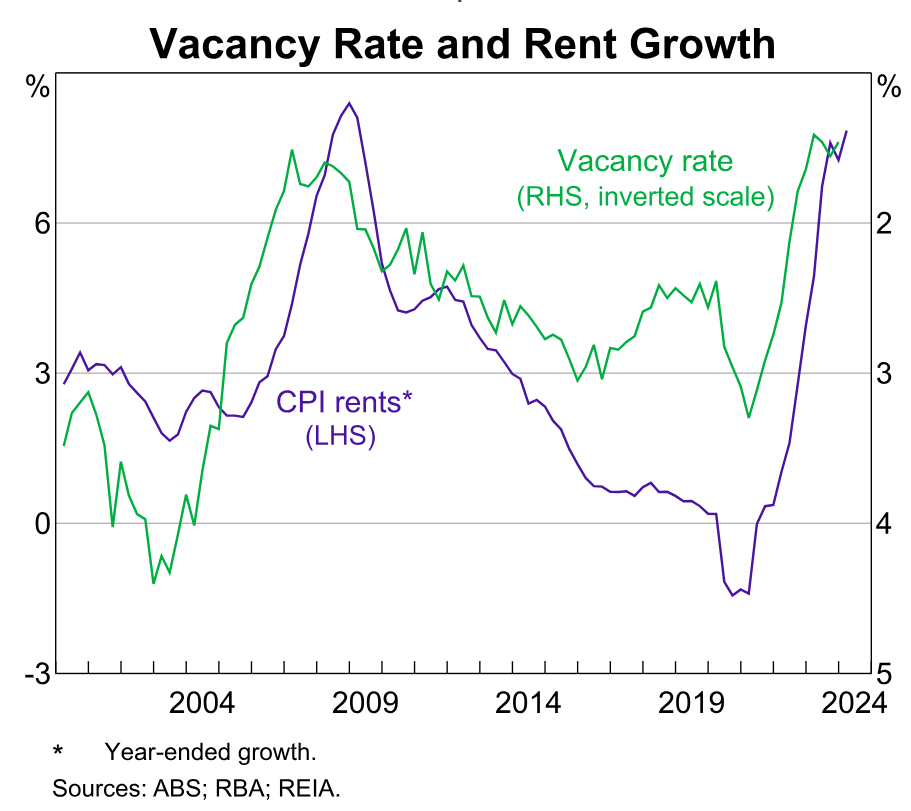The RBA yesterday painted a dire outlook for Australian renters:

Overall then, there is currently an imbalance between new supply of housing and growth in demand. Given the implications of this for rents, construction costs and activity, we are closely watching how these imbalances unwind.
Our assessment is that there are several potential avenues through which these imbalances may be resolved. We have already seen rents and prices rise, average household size could increase (which would reduce demand, for a given population size) and the pace of growth in construction costs could moderate. These responses will work towards rebalancing the market and resolve the current squeeze.
For example, we are hearing reports from our liaison program that some developers can see the strength in underlying demand and expect to respond with new supply (although it is early days). Federal and state government initiatives that streamline the approvals and build process will also reduce costs, which will ultimately lift supply.
But it will not be a quick fix. Demand pressure, and so upward pressure on rents and prices, will remain until new supply comes online. We expect this response to take some time to materialise, given the current level of new dwelling approvals and the information from liaison that many projects are still not viable. In the meantime, we expect residential construction activity to remain relatively subdued (Graph 10).

To start with, this makes a complete mockery of the Albanese Government’s 1.2 million new homes by the end of the decade. It will be 700-800 at best.
So, if supply is not the answer, will it be a cut in demand?
This brings us to the LNP’s new policy announcements overnight. Opposition Peter Dutton Dutton stated that if elected, he would reduce the number of permanent visas from 185,000 this financial year to 140,000 for two years, 150,000 in year three, and 160,000 in year four.
If met, a big “if”, this is marginally below the Morrison Government’s targets and near where we spent much of the lost decade post-2012. It will also reduce the number of temporary migrants because it lowers the possibility of getting residency.
He also discussed further capping university places for foreigners, banning foreign purchases, and allowing youth to use super as a deposit.
Some of this is good policy. But none of it resolves the new housing crisis in Australia, which is not the price of homes (that is the old crisis, which Dutton will make worse) but the lack of enough affordable dwellings for rent.
Note the first chart above. During the Morrison years of Big Australia, rental dwellings were glutted as Chinese developers built like mad. They’re gone. And locals will not make up the gap.
So, running Morrison years immigration numbers will not solve the rental crisis.
I strolled through Melbourne City the other night, and it was shocking for any Australian. Every doorway had some poor soul curled up in a fetal position. People were literally stepping over bodies to get around.
Civil and polite Asian students make up the majority of the city population. They are not at fault. However, the displacement of rental stock they have triggered has created a high level of aggression that has developed in what was once Australia’s most livable city.
It wasn’t so much a case of “vibrancy” as it was violence.
The government knows the problem because six police officers are standing on every corner. The rumours of assaults are rife. I only just dodged one homeless fellow on a rampage myself, despite a police cordon within spitting distance.
There are now whole streets in central Melbourne that one is ill-advised to traverse because of the angry homeless.
Dutton’s proposals will help at the margin. But this unnecessary rental shock will continue under them.
This is an outright crisis, and as the margins of Australian society thicken and toxify, it is being treated, as usual, as some focus group exercise.
There but for the grace of God goes Peter Dutton.

